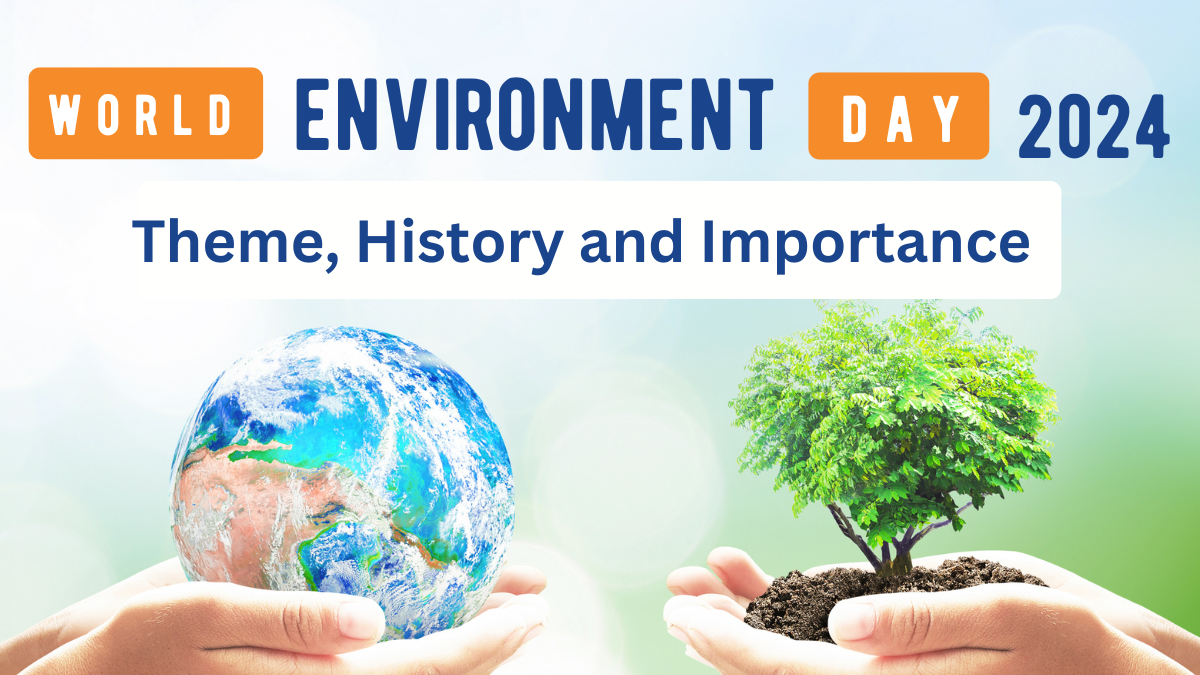World Environment Day is celebrated every year on June 5. This day is observed to encourage environmental awareness and protection. According to the United Nations, “The celebration of this day provides us with a chance to extend the basis for an enlightened opinion and responsible behavior by individuals, businesses, and communities in protecting and enriching the environment.”
Every year, the United Nations declares a specific theme for World Environment Day celebrations. The theme for the year 2024 is “Our Land, Our Future, We Are Generation Restoration,” revolving around land restoration, desertification, and drought resilience, emphasizing the importance of these issues in achieving sustainable development.

World Environment Day History
The day was first observed in 1974 in the city of Spokane in the USA. On the first day of the Stockholm Conference on the Human Environment, the United Nations General Assembly inaugurated World Environment Day in 1972. The first World Environment Day (WED) was observed two years later, in 1974, with the theme “Only One Earth.” Despite the fact that the Environment Day has been celebrated yearly since 1974, the idea of rotating the centre of these activities by selecting different host countries started in 1987.
World Environment Day Themes: 2010-2024
- 2010: ‘Many Species. One Planet. One Future’, was the theme of 2010. Hosted in Rwanda, it celebrated the diversity of life on Earth as part of the 2010 International Year of Biodiversity.
- 2011: The world environment day of 2011 was hosted by India and the theme was Forests—Nature At Your Service.
- 2012: World Environment Day 2012’s theme was Green Economy. The celebrations were held in Brazil.
- 2013: The theme of WED 2013 was “Think, Eat, Save.” According to the United Nations, one-third of all food produced does not make it from farm to table, resulting in the waste of 1.3 billion tonnes of food worth $1 billion. This amount would be sufficient to feed the world’s 870 million people suffering from hunger and also significantly reducing CO2 emissions.
- 2014: 2014 was dedicated to the sea, under the theme “Raise your Voice not the Sea Level!” in order to raise awareness on the problems island nations are facing due to rising sea levels.
- 2015: In 2015, WED was hosted by Milan, Italy, under the theme “Seven Billion People. One Planet. Consume with Care”. That year, WED was the most popular subject on Twitter in more than 20 countries.
- 2016: “Zero tolerance for the illegal trade in wildlife” was the theme of the 2016 edition, hosted by Angola
- 2017: The 2017 edition, was held under the slogan “Connecting People with Nature” to highlight the crucial role we play in protecting the planet, to which we are closely linked and depend on, with official celebrations taking place in Canada.
- 2018: The 2018 edition, hosted by India, aimed to “Beat Plastic Pollution”.
- 2019: WED focused its efforts to “Beat Air Pollution”, an issue chosen by China, a country deeply affected by this environmental problem.
- 2020: In 2020, the host was Colombia in partnership with Germany and the theme was biodiversity – a concern that is both urgent and existential.
- 2021: The theme for 2021 is “Ecosystem Restoration”, and was hosted by Pakistan. On this occasion, the UN Decade of Ecosystem Restoration was also be launched.
- 2022: The theme for 2022 was ‘Only One Earth’ and was hosted by Sweden. The theme was a nod to the first United Nations Conference on the Human Environment held in Stockholm in 1972.
- 2023: The theme for 2023 was “Beat Plastic Pollution” focused on addressing the global plastic pollution crisis and was hosted by Côte d’Ivoire (Ivory Coast), with support from the Netherlands.
- 2024: The theme for this year is “Our Land, Our Future, We Are Generation Restoration,” and it will be hosted by the Kingdom of Saudi Arabia , emphasizing land restoration, desertification, and drought resilience.
| Year | Theme | Host city |
| 1974 | Only one Earth during Expo ’74 | Spokane, United States |
| 1975 | Human Settlements | Dhaka, Bangladesh |
| 1976 | Water: Vital Resource for Life | Ontario, Canada |
| 1977 | Ozone Layer Environmental Concern; Lands Loss and Soil Degradation | Sylhet, Bangladesh |
| 1978 | Development Without Destruction | Sylhet, Bangladesh |
| 1979 | Only One Future for Our Children – Development Without Destruction | Sylhet, Bangladesh |
| 1980 | A New Challenge for the New Decade: Development Without Destruction | Sylhet, Bangladesh |
| 1981 | Ground Water; Toxic Chemicals in Human Food Chains | Sylhet, Bangladesh |
| 1982 | Ten Years After Stockholm (Renewal of Environmental Concerns) | Dhaka, Bangladesh |
| 1983 | Managing and Disposing Hazardous Waste: Acid Rain and Energy | Sylhet, Bangladesh |
| 1984 | Desertification | Rajshahi, Bangladesh |
| 1985 | Youth: Population and the Environment | Islamabad, Pakistan |
| 1986 | A Tree for Peace | Ontario, Canada |
| 1987 | Environment and Shelter: More Than A Roof | Nairobi, Kenya |
| 1988 | When People Put the Environment First, Development Will Last | Bangkok, Thailand |
| 1989 | Global Warming | Brussels, Belgium |
| 1990 | Children and the Environment | Mexico City, Mexico |
| 1991 | Climate Change. Need for Global Partnership | Stockholm, Sweden |
| 1992 | Only One Earth, Care and Share | Rio de Janeiro, Brazil |
| 1993 | Poverty and the Environment – Breaking the Vicious Circle | Beijing, People’s Republic of China |
| 1994 | One Earth One Family | London, United Kingdom |
| 1995 | We the Peoples: United for the Global Environment | Pretoria, South Africa |
| 1996 | Our Earth, Our Habitat, Our Home | Istanbul, Turkey |
| 1997 | For Life on Earth | Seoul, Republic of Korea |
| 1998 | For Life on Earth – Save Our Seas | Moscow, Russian Federation |
| 1999 | Our Earth – Our Future – Just Save It! | Tokyo, Japan |
| 2000 | The Environment Millennium – Time to Act | Adelaide, Australia |
| 2001 | Connect with the World Wide Web of Life | Torino, Italy and Havana, Cuba |
| 2002 | Give Earth a Chance | Shenzhen, People’s Republic of China |
| 2003 | Water – Two Billion People are Dying for It! | Beirut, Lebanon |
| 2004 | Wanted! Seas and Oceans – Dead or Alive? | Barcelona, Spain |
| 2005 | Green Cities – Plan for the Planet! | San Francisco, United States |
| 2006 | Deserts and Desertification – Don’t Desert Drylands! | Algiers, Algeria |
| 2007 | Melting Ice – a Hot Topic? | London, England |
| 2008 | Kick The Habit – Towards A Low Carbon Economy | Wellington, New Zealand |
| 2009 | Your Planet Needs You – Unite to Combat Climate Change | Mexico City, Mexico |
| 2010 | Many Species. One Planet. One Future | Rangpur, Bangladesh |
| 2011 | Forests: Nature at your Service | Delhi, India |
| 2012 | Green Economy: Does it include you? | Brasilia, Brazil |
| 2013 | Think.Eat.Save. Reduce Your Foodprint | Ulaanbaatar, Mongolia |
| 2014 | Raise your voice, not the sea level | Bridgetown, Barbados |
| 2015 | Seven Billion Dreams. One Planet. Consume with Care. | Rome, Italy |
| 2016 | Zero Tolerance for the Illegal Wildlife trade | Luanda, Angola |
| 2017 | Connecting People to Nature – in the city and on the land, from the poles to the equator | Ottawa, Canada |
| 2018 | Beat Plastic Pollution | New Delhi, India |
| 2019 | Beat Air Pollution | China |
| 2020 | Time for Nature | Colombia |
| 2021 | Ecosystem restoration | Pakistan |
| 2022 | Only one Earth: Living in harmony with nature | Sweden |
| 2023 | Beat Plastic Pollution | Côte d’Ivoire (Ivory Coast) and Netherlands |
| 2024 | Our Land, Our Future, We Are Generation Restoration | Kingdom of Saudi Arabia |
World Environment Day 2024 – Putting Land Restoration on a Podium
The theme for World Environment Day this year is “Our Land, Our Future, We Are Generation Restoration.” This theme focuses on the important issues of land restoration, desertification, and drought resilience. It stresses upon the importance of these factors in achieving sustainable development. Land restoration is not just a necessity for environmental health but also a highly important element in the fight against climate change, food insecurity, and poverty. The emphasis on land restoration ties directly into the broader framework of the UN Decade on Ecosystem Restoration (2021-2030), a global initiative dedicated to protecting and reviving ecosystems worldwide.
Ecosystem restoration is essential for achieving the Sustainable Development Goals (SDGs), as healthy ecosystems are foundational to human well-being and the planet’s health. By restoring land, we enhance biodiversity, improve soil fertility, and increase resilience to climate impacts such as floods and droughts. Moreover, restored lands can boost local economies by creating jobs in agriculture, forestry, and tourism, contributing to social stability and sustainable livelihoods.
The theme “Our Land, Our Future, We Are Generation Restoration” serves as a rallying call for individuals, communities, and nations to take action. It highlights the interconnectedness of environmental health and human prosperity, urging collective efforts to restore degraded lands for a sustainable and resilient future.
Land Restoration: Why Does it Really Matter?
Land restoration is critically important for several compelling reasons. Firstly, it plays a vital role in combating climate change. Restoring degraded lands enhances their capacity to sequester carbon, thereby reducing greenhouse gas concentrations in the atmosphere. This process is essential for mitigating global warming and its associated impacts.
Secondly, land restoration is crucial for maintaining biodiversity. Degraded lands often lose their ability to support diverse plant and animal life. By restoring these ecosystems, we can help preserve species and maintain the balance of natural habitats, which is essential for ecological stability.
Moreover, land restoration significantly contributes to food security. Healthy soils are more productive, supporting higher agricultural yields and more resilient crops. This is especially important in regions prone to drought and desertification, where restored lands can sustain local communities and reduce the risk of famine.
In addition to environmental benefits, land restoration has substantial socio-economic impacts. It creates jobs and supports sustainable livelihoods in agriculture, forestry, and related sectors. Improved land conditions can also enhance water quality and availability, essential for human consumption and agricultural use.
Ultimately, land restoration is a cornerstone of sustainable development. It underpins efforts to achieve the Sustainable Development Goals by promoting environmental health, economic growth, and social well-being.
Investing in Land Restoration is investing in our future
Investing in land restoration is investing in our future, as it is fundamental to the health of our planet and the well-being of humanity. Restoring degraded lands enhances their ability to sequester carbon, thus playing a crucial role in mitigating climate change. This is essential for reducing the impacts of global warming and achieving climate resilience.
Moreover, land restoration improves soil fertility and productivity, which are critical for food security. Healthy, restored lands can sustain higher agricultural yields, supporting the livelihoods of millions of farmers and ensuring stable food supplies for growing populations. This is particularly vital in regions vulnerable to desertification and drought.
Economically, land restoration generates significant returns. It creates jobs in various sectors, including agriculture, forestry, and conservation. It also boosts local economies by revitalizing degraded areas, making them productive and sustainable.
Socially, investing in land restoration enhances water quality and availability, supports biodiversity, and fosters healthier ecosystems. These benefits contribute to improved quality of life and reduced poverty. Ultimately, investing in land restoration aligns with sustainable development goals, ensuring a prosperous, resilient, and sustainable future for all.
Importance of World Environment Day
World Environment Day is the major annual event organised by the United Nations to raise public awareness about environmental issues. Its main goal is to examine numerous concerns such as air pollution, extreme climatic changes, greenhouse effect, global warming, and the black-hole effect.
According to the World Environment Day Global website, one million plant and animal species are currently driven to the risk of extinction. The goal is for young people to recognize that they have a role to play in preventing biodiversity loss and preserving nature for future generations. For any aspirants hoping to prepare for competitive exams focused on agriculture like NABARD Grade A or Grade B and other exams like IBPS SO AFO and other such exams need to have a clear cut knowledge about World Environment Day and the different themes for each year. A lot of this information will be provided to you on ixamBee’s BeePedia platform.
To help you prepare 50% faster for competitive exams, ixamBee provides free Mock Test Series and all the Current Affairs in English and Current Affairs in Hindi in the BeePedia capsules for GA Preparation. You can also get the latest updates for Bank PO, Bank Clerk, SSC, RBI Grade B, NABARD, and Other Government Jobs.
Also Read:
RBI Moves 100 Tonnes of Gold to India: What It Means
Effective Ways to Read Newspaper for Banking Exams
Everything to Know About the World’s Top Central Banks














